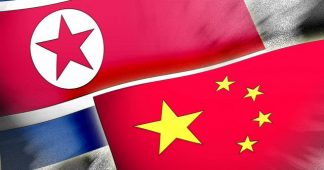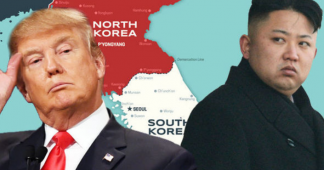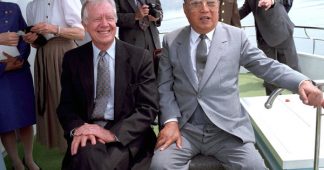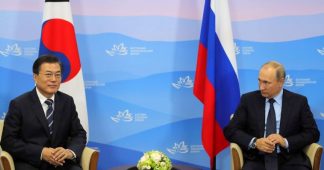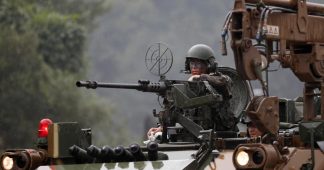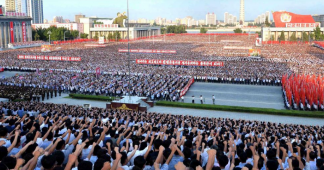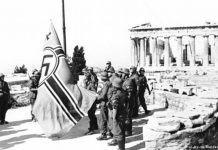“Those who consider North Korea a backward state somewhere far away in the middle of nowhere, make a big mistake.”
By Charles Bausman
Here is an excellent example of how Russian TV news is sometimes head and shoulders above the mainstream in the US and Europe.
To start with, this report is 12 minutes long – almost unheard of in the US, – in Russia it is very common.
This report is chock-full of fascinating insight, with rare footage you would never see in the West.
t interviews four truly top-notch Russian experts who have spent many years inside N. Korea, and know the country well.
These are clearly serious, experienced people well worth listening to, – 12 minutes well-spent.
I am 100% certain there will not be any war in N. Korea. I wrote an article explaining why on Friday.
If you think these articles are valuable, please consider donating to our Fall Fund Drive. You will not find this remarkable info anywhere else on the internet.
Both videos are from our own Youtube channel.
Alternative media are under attack as never before, and we need your support!
(Bullet list of main points and full transcript follow below)
Some interesting points:
- The Korean state is 3250 years old.
- They had book printing 320 years before Gutenberg.
- Luxury jeeps on the streets of Pyongyang suggest the country is not as poor as people say.
- Info about and footage of Kim’s pretty, pop-star wife
- Russian population centers of Vladivostok and Hassan are a few miles away – if war comes to N. Korea, particularly nuclear war, it will be a disaster for Russia too.
- North and South Koreans think of themselves as one nation, one race, and both are fiercely nationalistic and look down on other races. The two countries are much closer emotionally than people in the West realize. Foreigners are enemies in North and South alike.
- N. Korea has a complex caste system which is officially supported. It has 51 castes.
- N. Korea abandoned Marxism in the 1970s!
- Why the energy embargo won’t hurt the North much (they have plenty of coal)
- A look inside a typical Korean apartment.
- Government decisions are made collectively – it is not an autocracy headed by Kim.
- Government and army extremely rational in their behavior.
- A very tough, united people prepared to fight for their lives. No 5th column. People trained for nuclear war, not intimidated by it.
- N. Korea has diplomatic relations with 161 nations, but not with US.
- N. Koreans are ready to fight, and not afraid of war. Impossible to bring this proud people to their knees.
Here’s the full transcript:
And now let’s go back to what was only briefly mentioned earlier— the crisis surrounding North Korea. And, to the sensational words of Putin that, I quote,
“North Koreans will eat grass, but they won’t give up nuclear weapons”.
Putin gives an excellent answer at a recent press conference, demonstrating that he understands Korea much better than the US leadership
However, this is nothing they should be praised for. So, what would a unified and firm response to Pyongyang be, according to France’s young president—Macron? Let’s figure it out.
Fortunately, the missiles of young Marshal Kim Jong-un, as far as we know, aren’t pointed at Russia. But if it all goes wrong on the Korean peninsula, whether the young Marshal attacks the South or the United States starts hunting him, it’ll be bad for us, too.
Vladivostok and the border city of Hassan, located on the Tumen river, is a stone’s throw away. However, at the same time, this proximity allows us to ascertain the mood of North Korea better.
Russia has an embassy there. (the US does not).
From Russia to there, one can take a ferry, a train, and a regular flight. By the way, the Vladivostok-Pyongyang connection is served by a Russian-made aircraft—the Tu-204. There’s one more connection. Our film crew took this flight.
One of my most unexpected impressions is that Pyongyang’s famous traffic police, who, of course, wear the uniform of Stalin’s times, regulate the movement of, as the youth would say, tricked-out jeeps. And, this is in a country which is generally considered to be extremely poor.
Well, it seems that the organization of North Korean society is much more complicated. Now, you will see today’s shots. It’s a familiar picture, of course. Last Saturday, the DPRK celebrated what they call “The Day of the Foundation of the Republic.” Today, we’ll turn to those who weren’t occasional visitors, but saw this all the time, lived there.
In particular, our interlocutor is a Russian doctor, Yuri Belenkov, the personal physician of the founder of the DPRK, Kim Il-sung, the grandfather of the current Marshall—Kim Jong-un.
So, how does the consciousness of the Koreans work? What can one expect from them? Our Dmitry Petrov collected the opinion of actual experts.
A lot of things are known about the young marshal, Kim Jong-un, but at the same time, almost nothing is known. Here he is with his wife, who has a designer handbag which is unprecedented for the DPRK. But then, the wife disappears just as suddenly for several months at a time. Why? After all, there is no reliable information about how many children they had and when they were born. And, thanks to Kim Jong-un, the female vocal-instrumental ensemble of the Korean People’s Army forces its way to the world pop market. But it’s unknown whether his wife came out of it.
The ensemble performs under a documentary film, which pictures the grandfather of the present leader—Kim Il-sung, whom his grandson resembles so much.
And in Russia, we know for sure about him, about Kim Il-sung, that our Soviet doctor, Yuri Belenkov, was his personal physician.
He also saw how they started the rocket and space industry of North Korea. And, it doesn’t surprise him that Pyongyang has nuclear weapons now.
“Those who consider North Korea a backward state somewhere far away in the middle of nowhere, make a big mistake.”
“The history of statehood in Korea totals 3,320 years, by the way. In North Korea, in some Shinto monasteries, there are some in the mountains, to be honest, I saw tablets for book printing that were made 320 years earlier than Gutenberg’s ones.”
“It’s a very big mistake to think that this is a distant and underdeveloped country. There is no big surprise for me that they can make a big leap.”
After all, we have long been convinced by the example of South Korea that the Koreans have natural talents and the ability to mobilize to solve common goals. In two decades, being the Asian tiger, it leaped from the post-war devastation into the 21st century. And, this is one people.
“Of course, the Koreans are one people. They have the same genetic code.”
Another one of our interlocutors is a scientist specializing in Korea, a dean of MGIMO, (Russia’s top university for international relations) the academic Anatoly Torkunov.
“I worked in Pyongyang in 1972, when the joint declaration of the North and the South was proclaimed. I remember that for us, it was such a shock. It seemed that everything began moving. Look, it’s been years since then, it’s scary to say how many, and we still keep coming back to the Korean problems and the tension that exists on the Korean Peninsula.”
Konstantin Belov, the last correspondent of Soviet television in the DPRK, spent five years studying at the University of Pyongyang. Then, he was on business trips in the North and South.
And, he was able to make sure that the northerners and southerners were united by something else.
“I think that what they have in common is nationalism. They, in general, don’t treat other nations very well. For them, their own nation is above all. In this, I think, they are alike. For a Korean, any foreigner is an enemy.
In the North, there is also a rigid and officially proclaimed social hierarchy.”
This order, songbun, is approved quite officially.
For reference: in 1957, the founding father of the DPRK, Kim Il-sung, explained the division of society into three main strata: friendlies, neutrals, and hostiles. And they, in turn, were divided into 51 groups.
The lowest caste consisted of former landowners, traders, lawyers, and Christian priests. And even their descendants.
There’ll be no war only because the Koreans are ready for this war and aren’t afraid of it.
“There’ll be no war due to the fact that these people can’t be brought to their knees. One can only talk to these people as an equal, respecting it and its culture.”
Kazbek Taisayev is a member of the State Duma of the Russian Federation and a secretary of the Central Committee of the Communist Party of the Russian Federation, visits the DPRK regularly.
But is North Korea really a communist country?
They haven’t studied Marx and Engels in the universities since the 70’s. And the 1990s became a breaking point for the DPRK. After the collapse of the socialist camp, the people of DPRK got hungry.
As a result, the leaders weakened their grip and allowed private entrepreneurship.
There was a home-grown socialist bourgeoisie formed that included the former ones. But even before that, “real socialism,” which was being built in the DPRK, wasn’t so much socialism as it was Juche.
So, relying on their own resources, Korean villagers still plow with oxen and use trucks with wood-burning engines. And until recently, tires which went flat due to wear and tear were simply filled with straw. And that’s how they got around.
Out of 25 thousand kilometers of roads, only 724 kilometers are paved.
Here’s the famous photo of the Korean Peninsula from space at night. The south is filled with light, and in the north, it’s dark.
It’s pretty much the same story with the DPRK embassy in Russia in comparison to the rest of Moscow. The streets and sidewalks are lit, and over there it’s dark—they are trying to save money.
According to the leaks, the Americans are proposing an oil embargo against the DPRK. However, first of all, it’s not yet known what North Korea’s oil reserves actually consist of. Also, the coat of arms of the DPRK explains a lot. It has a red star, rice ears, and a hydroelectric power station.
The country of the mountains, the DPRK, has built many hydro stations.
South Korea looks like the glamorous capitalistic South, but it produces ten times less coal than the North. And in the DPRK, three-quarters of the electricity is generated with coal. That is, the energy embargo isn’t so terrible for the North.
At night, they can not only illuminate the monument to the leaders, but also power sites belonging to the military-industrial complex.
If you look closely, the parades in Pyongyang consist of typical machinery needed for local production or modernization, and, of course, a stable power supply for enterprises where they make nuclear weapons and missiles.
As for the North Korean commoners, they don’t know any other life.
Here we have a kitchen, here are cups for rice, there is cold and even hot water. Here is the generator. Here is the rice that they give out to each family. 10 kilograms per month. For this simple prosperity, the people of the DPRK thank their leaders, the current Illustrious Comrade Kim Jong-un, his father and grandfather, to whom the Koreans gave a whole list of sonorous titles.
The Generalissimos and the elder one is also the Eternal President. Many researchers are trying to unravel the phenomenon of the guaranteed transfer of power from grandfather to grandson in the Juche format.
For reference: last year the Constitution of the DPRK was amended. Instead of the abolished Committee of National Defense, a Commission on State Affairs, headed by Kim Jong-un, was established.
In theory, everything is canonical: a new body, I quote, “Oversees the execution of orders of its chairman.” But after all, it exists, so the leadership is still collective.
“The decisions are made, of course, by the leader, but there is also the Central Committee, the Politburo of the Workers’ Party of Korea, there is the Presidium of the Politburo. I think that the decisions that are made are taken collectively within the framework of the governmental system that exists there.”
“It’s not that, say, Kim Jong-un says, “I’m ready, let’s launch a rocket”.
“This applies not only to Kim Jong-un but to his grandfather and father. These are people who always had very good advisers. Can they negotiate? Of course, yes, of course, but on equal terms.”
“Is it possible to bend the Koreans? I seriously doubt it. “
That’s not about Kim Jong-un alone. And yet, let’s go back to his grandfather, Kim Il-sung. Please note that his shoulder straps of the Marshal of the DPRK, in fact, are identical to the shoulder straps of the Marshal of the Soviet Union.
But in North Korea, there is also the title of the Marshal of the Army. And it has its own core.
The army has its own Politburo. And it’s headed by the Deputy Head of the Party’s Politburo. It’s complicated. In fact, not simple at all.
“They are not fanatics or pragmatists. They raise the bar all the time. It seems to them that now is the moment, which is also connected to the election of the new president in the US, when this bar can be raised, and the level of tension reaches the highest level, which will allow them to negotiate certain conditions.”
The Americans say that North Korea is going to war. Is it, in fact, ready for it, can they start it?
“The Americans? — No, North Korea. Start it? I don’t think so, but I don’t envy the person who gets in a fight with them.”
“This is a very disciplined, very united nation. There is no fifth column. That is, they are people whom you can’t disregard. And it’s not about the leader of the country, it’s about people who can’t be ignored.”
“We asked our Korean teachers a question. How can it happen? Nuclear war is dangerous, terrible, and frightening.”
“They said that it was no big deal. Let there be a nuclear war, Korean teachers told us. We have a lot of tunnels underground, we’ll all hide there, we’ll wait, we’ll play the accordion, we’ll have a good time. And when it’s all over, we will go out and build socialism.”
According to some reports, the current leader of the DPRK, Kim Jong-un, when he was a child, studied in a private boarding school in Switzerland.
And, despite the self-declared self-sufficiency, North Korea has diplomatic relations with 161 countries.
The United States and Japan aren’t among them, which, of course, complicates the resolution of such crises.
